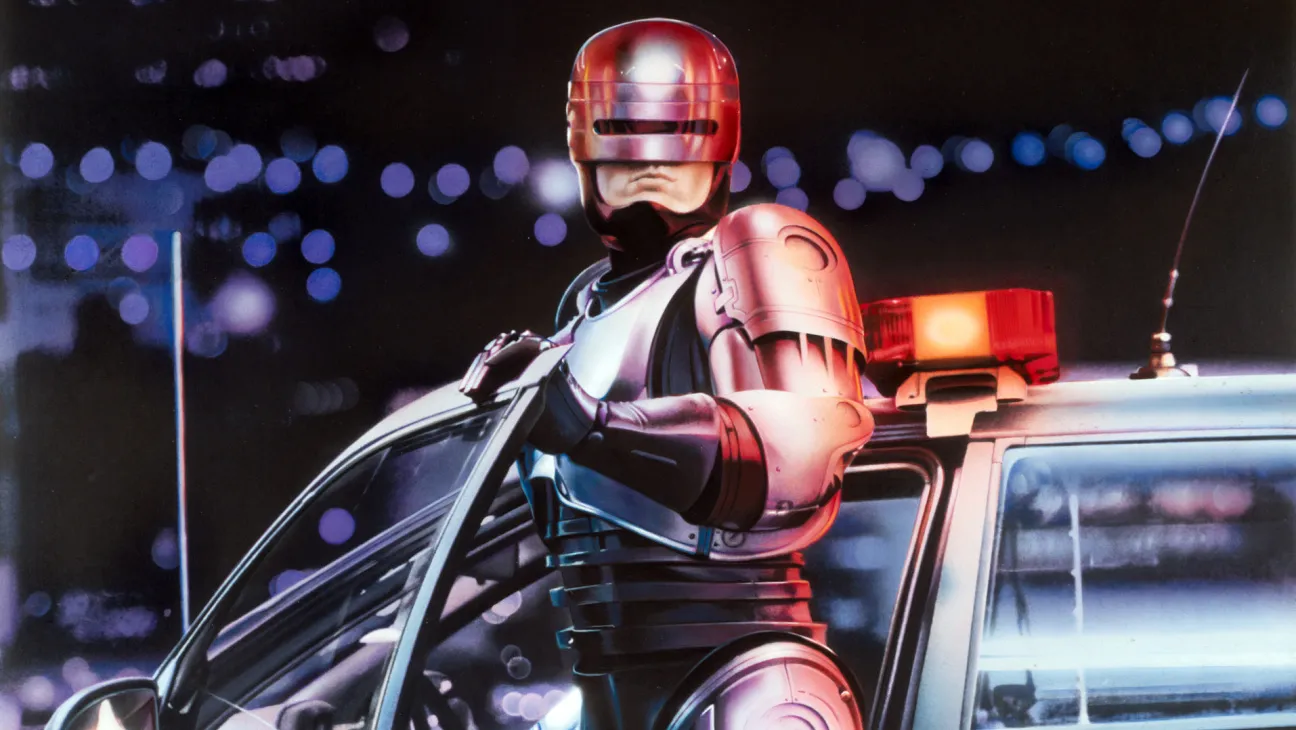RoboCop (1987)

Released in 1987, “RoboCop” is a seminal action and science fiction film directed by Paul Verhoeven that has since become a cornerstone of the genre. Written by Edward Neumeier and Michael Miner, the film explores themes of technology, identity, and the moral implications of corporate greed in a dystopian future. With its blend of action-packed sequences, dark humor, and social commentary, “RoboCop” not only entertains but also prompts audiences to reflect on the consequences of a society increasingly dominated by technology and capitalism.
Set in a near-future Detroit, “RoboCop” introduces viewers to a city plagued by crime and corruption. The film opens with a gripping portrayal of urban decay and lawlessness, establishing a stark contrast between the chaos of the streets and the corporate machinations of Omni Consumer Products (OCP), the company that aims to take control of the city. The narrative follows Alex Murphy (Peter Weller), a dedicated police officer who becomes a victim of violent crime. After being brutally murdered by a gang, Murphy is resurrected by OCP as RoboCop, a cyborg programmed to enforce the law and rid the city of crime.
The transformation of Alex Murphy into RoboCop serves as a powerful exploration of identity and humanity. As a cyborg, he embodies the fusion of man and machine, raising questions about what it means to be human in an increasingly mechanized world. Throughout the film, RoboCop grapples with fragments of his former identity, struggling to reconcile his past as a human with his new existence as a machine. This conflict is poignantly depicted in several key scenes, showcasing Murphy’s longing for his former life and the emotional toll of his transformation.
Peter Weller’s performance as RoboCop is both compelling and nuanced. He captures the character’s struggle with his lost humanity, portraying a sense of confusion and emotional conflict beneath the cold exterior of the cyborg. Weller’s ability to convey subtle emotions through body language, even while encased in the iconic metallic suit, adds depth to the character and invites audiences to empathize with his plight. The character’s journey from a tragic victim to a symbol of justice resonates deeply, making RoboCop a complex and relatable figure.
One of the film’s standout features is its sharp satirical edge. “RoboCop” uses dark humor to critique the commercialization of society and the dehumanizing effects of corporate power. The depiction of OCP as a soulless corporation willing to sacrifice ethics for profit serves as a scathing commentary on capitalism. The film’s fictional advertisements and news segments satirize consumer culture, revealing the absurdity of a society that prioritizes profit over people. This social critique remains relevant today, resonating with audiences in an era increasingly concerned with corporate influence on everyday life.

Visually, “RoboCop” is striking, with a distinctive aesthetic that combines elements of film noir and futuristic design. The cinematography, led by Jost Vacano, effectively captures the gritty atmosphere of Detroit, immersing viewers in a world that feels both familiar and unsettling. The film’s use of practical effects and animatronics adds a tangible quality to the action sequences, making them feel more visceral and impactful. The iconic design of RoboCop himself, with his imposing armor and helmet, has left an indelible mark on popular culture and the science fiction genre.
The action sequences in “RoboCop” are thrilling and well-crafted, balancing intense violence with moments of dark comedy. The film does not shy away from graphic imagery, using violence to underscore the severity of the societal breakdown depicted in the story. However, this violence is often tempered by the film’s satirical tone, creating a unique viewing experience that blends horror with humor. The contrast between the brutal realities of crime and the absurdity of corporate solutions is a recurring theme that elevates the film beyond mere spectacle.

The supporting cast also contributes significantly to the film’s impact. Characters like Clarence Boddicker (Kurtwood Smith), the ruthless gang leader, and Bob Morton (Miguel Ferrer), the ambitious OCP executive, add layers to the narrative. Boddicker’s cold-blooded nature and his interactions with RoboCop exemplify the moral decay present in the society the film portrays. Meanwhile, Morton’s character embodies the cutthroat ambition of corporate culture, highlighting the film’s critique of capitalism.
As the story unfolds, RoboCop becomes a symbol of hope for the people of Detroit, embodying the possibility of justice in a world overrun by crime and corruption. His pursuit of justice leads him to confront not only the criminals but also the very corporation that created him. This conflict serves as a powerful climax, culminating in a showdown that challenges the notions of loyalty, control, and the essence of humanity.

In conclusion, “RoboCop” is a landmark film that transcends its genre, combining thrilling action with profound social commentary. Paul Verhoeven’s direction, coupled with Peter Weller’s memorable performance, creates a narrative that is both entertaining and thought-provoking. The film’s exploration of identity, technology, and corporate greed remains relevant today, resonating with audiences as they navigate the complexities of modern society. “RoboCop” endures as a classic, a film that not only defined a generation but continues to inspire discussions about the implications of our increasingly mechanized world. Through its blend of dark humor, gripping action, and poignant themes, “RoboCop” solidifies its place in cinematic history as a groundbreaking work that challenges us to confront the moral dilemmas of our time.










